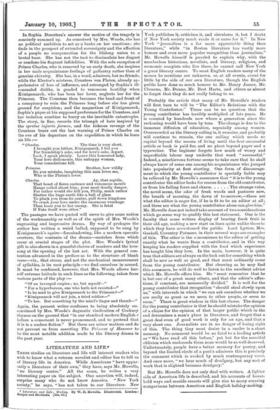LITERATURE AND LIFE.*
THESE studies on literature and life will interest readers who wish to know what a veteran novelist and editor has to tell us of literary life in America. While Americans " have appar- ently a literature of their own," they have, says Mr. Howells, "no literary centre." All the same, he writes a very interesting paper on the subject. One assertion will, indeed, surprise many who do not know America. " New York society," he says, "has not taken to our literature. New • Literature and Life : Studies. By W. D. Howells. Illustrated. London: Harper and Brothers. [10s. 6c1.]
York publishes it, criticises it, and circulates it, but I doubt if New York society much reads it or cares for it." In New York " journalism is a far more appreciable thing than literature," while "in Boston literature has vastly more honour and even more popular recognition than journalism." Mr. Howells himself is puzzled to explain why, with the numberless historians, novelists, and literary, religious, and economic essayists who live there, he cannot call New York a great literary centre. To most English readers many of the names he mentions are unknown, or, at all events, count for little by the side of our own literature, though the English public have done so much honour to Mr. Henry James, Mr. Clemens, Mr. Dunne, Mr. Bret Harte, and others as almost to forget that they do not really belong to us.
Probably the article that many of Mr. Howells's readers will first turn to will be " The Editor's Relations with the Young Contributor." There can be no question that the young contributor has terribly multiplied of late years. He is counted by hundreds now where a generation since the reckoning would have been by tens. The change is due to the immense diffusion of education, especially among women. Overcrowded as the literary calling is, it remains, and probably will continue to remain, the one calling which needs no capital beyond the means of living until the first successful article or book is paid for, and no plant beyond paper and a typewriter. The beginner forgets how much of weary and unprofitable labour may underlie that word " successful." Indeed, a mischievous fortune seems to take care that he shall always know of some one among his acquaintance who jumped into popularity at first starting. One form of discourage- ment to which the young contributor is specially liable may be relieved by Mr. Howells's assurance that " it is to the young contributor the editor looks for rescue from the old contributor, or from his failing force and charm The strange voice, the novel scene, the odor of fresh woods and pastures new, the breath of morning, the dawn of to-morrow,—these are what the editor is eager for, if he is fit to be an editor at all; and these are what the young contributor alone can give him." Mr. Howells does not indeed take account of two considerations which go some way to qualify this last statement. One is the faculty that some writers display of bearing fresh fruit in their old age, making a new start on lines quite unlike those to which they have accustomed the public. Lord Lytton, Mrs. Gaskell, Coventry Patmore, in their several ways are examples of this. The other is the convenience to the editor of getting exactly what he wants from a contributor, and in this way keeping his readers supplied with the food which experience has taught him they love. In the main, however, it is quite true that editors are always on the look out for something which shall be new as well as good, and that must ordinarily come from the young contributor. But cheering as he may find this assurance, he will do well to listen to the excellent advice which Mr. Howells offers him. He " must remember that he is but one of a great many others, and that the editor's affec- tions, if constant, are necessarily divided." It is well for the young contributor that recognition " should steal slowly upon us," with intervals in which " we can ask ourselves whether we are really so great as we seem to other people, or seem to seem." There is great wisdom in this last clause. The danger for the young' contributor is that he should mistake the opinion of a clique for the opinion of that larger public which in the end determines a man's place in literature, and forget that a great deal even of good work is only for an age, and that a very short one. Journalists are in no danger of losing sight of this. The thing they most desire in a reader is a short memory. No comment would be so fatal to a leading article as " We have read all this before," yet but for the merciful oblivion which enshrouds them none would be so well deserved. Unfortunately, people have a better memory for poetry, and beyond the limited circle of a poet's admirers this is precisely the comment which is evoked by much contemporary verse. And once more, "we hear much of drudgery, but any sort of work that is slighted becomes drudgery."
But Mr. Howells does not only deal with writers. A lighter side of American life is described, and his accounts of house- hold ways and seaside resorts will give rise to many amusing comparisons between American and English holiday-making.






































 Previous page
Previous page